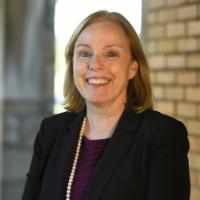Psychotherapy Commission Accomplishments and Strategic Planning Efforts

While some of our colleagues, especially in the south, are suffering from the effects of wild weather, here in the New York City metropolitan area, I’m heartened to see and feel hints of spring – crocuses popping up from the ground, more hours of sunlight, warmer days. As a Christian, I give thanks for the observances of Holy Week and Easter. Blessings to all who celebrate religious feasts in April -- may you, your families, and your religious communities be filled with joy!
I take this opportunity to share with you some accomplishments of and plans for the Psychotherapy Commission. We have so much to celebrate! It seems like yesterday that we transitioned from AAPC to ACPE and began the work of establishing the Psychotherapy Commission. We have worked so hard during this time and will be welcoming our second Psychotherapy Commission chairperson at the beginning of 2022!
Having served as both the interim Psychotherapy Commission chair and the first permanent Psychotherapy Commission chair, I have had the privilege of working with an outstanding group of professionals whose primary goal in ACPE has been to advance the interests and needs of pastoral psychotherapists and other pastoral care practitioners in the association.
Since our interim commission began in 2019, we have undertaken a number of initiatives and accomplished significant goals for the advancement of the psychotherapy community in ACPE.
Our first task was to create the commission and establish membership criteria for ACPE Psychotherapists and Practitioners. We spent many months developing our membership categories and inviting former AAPC members into ACPE membership and leadership roles. As a commission, we also decided to develop an institutional member category, which strengthens our relationships with counseling centers and counselor education programs. This membership category provides significant benefits to groups seeking affiliation with ACPE. As time goes on, we continue to listen to our institutional members and further develop new ways to be in partnership. Our goal is to make many connections with our individual and institutional members today and in the future!
One of our earliest major projects was piloting and rolling out the Spiritually Integrated Psychotherapy Program (SIP) for ACPE members and potential new psychotherapy members. We have presented “train-the-trainer” events, which will lead to the preparation of psychotherapists interested in the integration of spirituality into their psychotherapy practices. Several SIP programs are being offered this spring; others will take place when we can return safely to face-to-face programming. Once new psychotherapists are trained, we hope that many of them will complete SIP certification requirements including supervision and participation in ACPE Communities of Practice.
On the subject of Communities of Practice, the Psychotherapy Commission has worked diligently to identify existing Communities of Practice that support the work of former AAPC psychotherapists and practitioners. We also have established new Communities of Practice focused on the needs of these groups. As mentioned above, ACPE psychotherapy members who enroll in SIP will be eligible to join new Communities of Practice that flow from their SIP training programs.
A significant accomplishment of the commission was the formation of the ACPE Continuing Education Work Group, which oversees our ongoing education offerings. The members of this meticulous work group have worked tirelessly to seek NBCC approval for ACPE Continuing Education programs. The Continuing Education Work Group also has highlighted the importance of including workshops of interest to psychotherapists at the Annual Conference. Many thanks to them for working to identify and develop continuing education opportunities for psychotherapists at annual conferences.
In 2020, the commission formed a task force dedicated to the implementation of an education program that leads practitioners to a certificate as a Pastoral Care Specialist. The original Pastoral Care Specialist program was a part of AAPC’s offerings; we are happy that this program has been renewed in ACPE. Members of this task force currently are piloting the newly revitalized Pastoral Care Specialist Program. Evaluation of the pilots will take place later this year, with a more formal rollout tentatively scheduled for late 2021 or early 2022.
We have so much to celebrate! Since our consolidation with ACPE, we have moved the Psychotherapy Commission from an idea to a vibrant group of professionals dedicated to incorporating psychotherapists in ACPE and expanding their roles in membership and leadership. We are thrilled with all that has been accomplished and look forward to so much more good work as we move forward.
Looking ahead, we have many new ways to grow. Never willing to stand still, the members of the Psychotherapy Commission are beginning work on a process of strategic planning. Where will we head in the next few years? What will be our top priorities? These are critical questions, and I will be soliciting your input as we begin to imagine our future as psychotherapists within ACPE.
I pray that all of you stay safe and healthy and enjoy the blessings of this beautiful season.
Rev. Dr. Joann Heaney-Hunter, M.S., Ph.D., LMHC, NCC, ACPE Psychotherapist, from St. John's University, Department of Theology and Religious Studies, Jamaica, NY, servers as chair of the Psychotherapy Commission. She may be contacted at heaneyhj@stjohns.edu.
